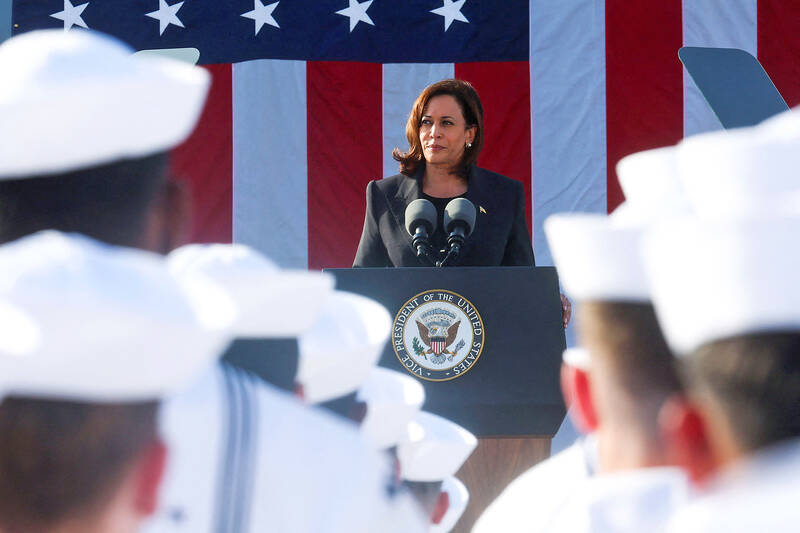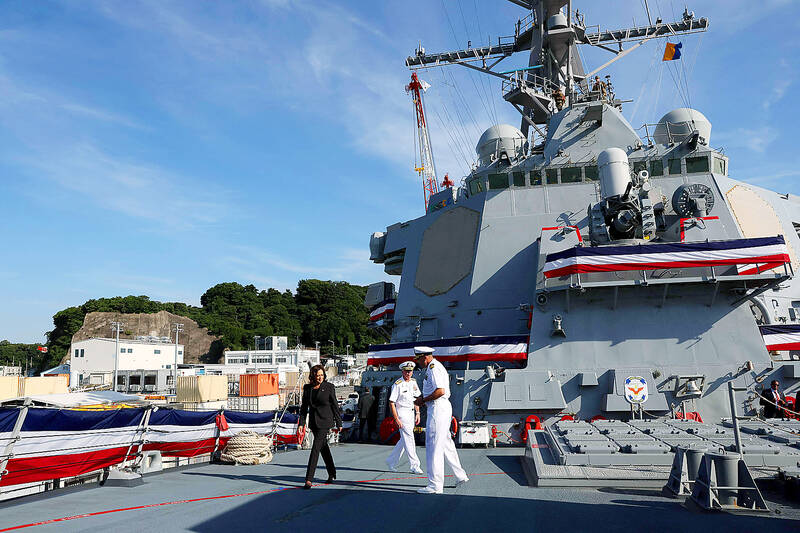US Vice President Kamala Harris on the deck of a US warship in Japan yesterday said that the administration of US President Joe Biden intends to deepen unofficial ties with Taiwan.
“Taiwan is a vibrant democracy that contributes to the global good — from technology to health, and beyond, and the United States will continue to deepen our unofficial ties,” Harris said aboard the USS Howard, an Arleigh Burke-class destroyer, excerpts of her speech released by the White House in advance showed.
She said that Beijing “has challenged freedom of the seas” and “has flexed its military and economic might to coerce and intimidate its neighbors.”

Photo: Reuters
Many have witnessed “disturbing behavior in the East China Sea and in the South China Sea, and most recently, provocations across the Taiwan Strait,” she said.
“The United States believes that peace and stability in the Taiwan Strait is an essential feature of a free and open Indo-Pacific,” Harris said.
Harris is on a four-day trip to Japan and South Korea intended to demonstrate US commitment to allies in the region.

Photo: AFP
The trip sets the stage for Biden’s visit to the region later this year, when he is expected to meet Chinese President Xi Jinping (習近平) and speak with allies about efforts to denuclearize the Korean Peninsula and address rising tensions over Taiwan.
Harris’ remarks to US sailors wearing dress whites came after Biden pledged in an interview aired on Sept. 18 to defend Taiwan against a hypothetical “unprecedented attack.”
Harris said that US forces would operate in the region “undaunted and unafraid” even as Washington expects “continued aggressive” actions by China.
“We will continue to oppose any unilateral change to the status quo,” she said. “And we will continue to support Taiwan’s self-defense, consistent with our long-standing policy.”
In Beijing, Chinese Ministry of Foreign Affairs spokesman Wang Wenbin (汪文斌) told a media briefing that Washington needed to return to the “one China” policy and “unequivocally make clear that it opposes all Taiwan separatist activities.”
Before Harris spoke to the US service members onboard the Howard, she stepped below deck and was given a demonstration of the warship’s missile and anti-submarine capabilities.
A commander pointed at a digital map showing a hypothetical enemy, a “hostile country” that he declined to identify.
“It’s not Guam,” he said.

AIR SUPPORT: The Ministry of National Defense thanked the US for the delivery, adding that it was an indicator of the White House’s commitment to the Taiwan Relations Act Deputy Minister of National Defense Po Horng-huei (柏鴻輝) and Representative to the US Alexander Yui on Friday attended a delivery ceremony for the first of Taiwan’s long-awaited 66 F-16C/D Block 70 jets at a Lockheed Martin Corp factory in Greenville, South Carolina. “We are so proud to be the global home of the F-16 and to support Taiwan’s air defense capabilities,” US Representative William Timmons wrote on X, alongside a photograph of Taiwanese and US officials at the event. The F-16C/D Block 70 jets Taiwan ordered have the same capabilities as aircraft that had been upgraded to F-16Vs. The batch of Lockheed Martin

GRIDLOCK: The National Fire Agency’s Special Search and Rescue team is on standby to travel to the countries to help out with the rescue effort A powerful earthquake rocked Myanmar and neighboring Thailand yesterday, killing at least three people in Bangkok and burying dozens when a high-rise building under construction collapsed. Footage shared on social media from Myanmar’s second-largest city showed widespread destruction, raising fears that many were trapped under the rubble or killed. The magnitude 7.7 earthquake, with an epicenter near Mandalay in Myanmar, struck at midday and was followed by a strong magnitude 6.4 aftershock. The extent of death, injury and destruction — especially in Myanmar, which is embroiled in a civil war and where information is tightly controlled at the best of times —

China's military today said it began joint army, navy and rocket force exercises around Taiwan to "serve as a stern warning and powerful deterrent against Taiwanese independence," calling President William Lai (賴清德) a "parasite." The exercises come after Lai called Beijing a "foreign hostile force" last month. More than 10 Chinese military ships approached close to Taiwan's 24 nautical mile (44.4km) contiguous zone this morning and Taiwan sent its own warships to respond, two senior Taiwanese officials said. Taiwan has not yet detected any live fire by the Chinese military so far, one of the officials said. The drills took place after US Secretary

THUGGISH BEHAVIOR: Encouraging people to report independence supporters is another intimidation tactic that threatens cross-strait peace, the state department said China setting up an online system for reporting “Taiwanese independence” advocates is an “irresponsible and reprehensible” act, a US government spokesperson said on Friday. “China’s call for private individuals to report on alleged ‘persecution or suppression’ by supposed ‘Taiwan independence henchmen and accomplices’ is irresponsible and reprehensible,” an unnamed US Department of State spokesperson told the Central News Agency in an e-mail. The move is part of Beijing’s “intimidation campaign” against Taiwan and its supporters, and is “threatening free speech around the world, destabilizing the Indo-Pacific region, and deliberately eroding the cross-strait status quo,” the spokesperson said. The Chinese Communist Party’s “threats